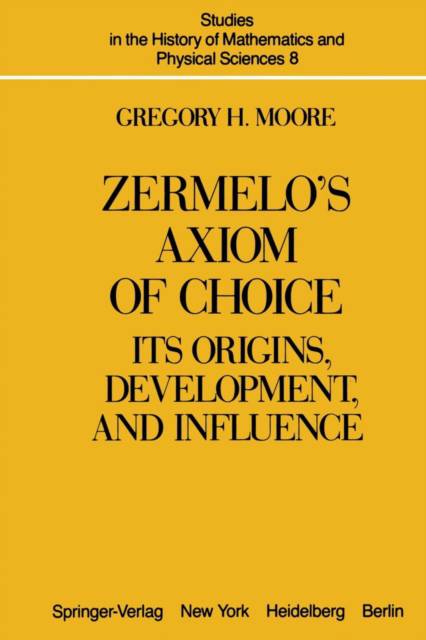
- Afhalen na 1 uur in een winkel met voorraad
- Gratis thuislevering in België vanaf € 30
- Ruim aanbod met 7 miljoen producten
- Afhalen na 1 uur in een winkel met voorraad
- Gratis thuislevering in België vanaf € 30
- Ruim aanbod met 7 miljoen producten
Zoeken
Omschrijving
This book grew out of my interest in what is common to three disciplines: mathematics, philosophy, and history. The origins of Zermelo's Axiom of Choice, as well as the controversy that it engendered, certainly lie in that intersection. Since the time of Aristotle, mathematics has been concerned alternately with its assumptions and with the objects, such as number and space, about which those assumptions were made. In the historical context of Zermelo's Axiom, I have explored both the vagaries and the fertility of this alternating concern. Though Zermelo's research has provided the focus for this book, much of it is devoted to the problems from which his work originated and to the later developments which, directly or indirectly, he inspired. A few remarks about format are in order. In this book a publication is indicated by a date after a name; so Hilbert 1926, 178 refers to page 178 of an article written by Hilbert, published in 1926, and listed in the bibliography.
Specificaties
Betrokkenen
- Auteur(s):
- Uitgeverij:
Inhoud
- Aantal bladzijden:
- 412
- Taal:
- Engels
- Reeks:
- Reeksnummer:
- nr. 8
Eigenschappen
- Productcode (EAN):
- 9781461394808
- Verschijningsdatum:
- 1/12/2011
- Uitvoering:
- Paperback
- Formaat:
- Trade paperback (VS)
- Afmetingen:
- 152 mm x 229 mm
- Gewicht:
- 566 g

Alleen bij Standaard Boekhandel
+ 167 punten op je klantenkaart van Standaard Boekhandel
Beoordelingen
We publiceren alleen reviews die voldoen aan de voorwaarden voor reviews. Bekijk onze voorwaarden voor reviews.











